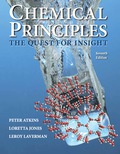
(a)
Interpretation:
The order with respect to each reactant and the overall order of the reaction have to be determined.
Concept Introduction:
The rate of the reaction is referred to the change in the molar concentration in the distinct interval of time. According to the rate law, the rate of the reaction is directly proportional to the initial concentration of the reactant of the reaction.
(a)
Answer to Problem 7A.15E
The order with respect to
Explanation of Solution
The given
Suppose the order of the reaction with respect to
Therefore, the generic rate law expression for the given chemical reaction is shown below.
Substitute the values of
Substitute the values of
Substitute the values of
Substitute the values of
Divide equation (2) and equation (5) to calculate the value of
Therefore, the order with respect to
Divide equation (2) and equation (3) to calculate the value of
Therefore, the order with respect to
Divide equation (2) and equation (4) to calculate the value of
Therefore, the order with respect to
Thus, the overall order of the reaction is
(b)
Interpretation:
The expression for the rate law has to be determined.
Concept Introduction:
Same as part (a).
(b)
Answer to Problem 7A.15E
The rate law for the given reaction,
Explanation of Solution
The order with respect to
Substitute the value of
Thus, the expression for rate law for the given chemical reaction is shown below.
(c)
Interpretation:
The rate constant for the given reaction has to be determined.
Concept Introduction:
Same as part (a).
(c)
Answer to Problem 7A.15E
The rate constant of the reaction is
Explanation of Solution
The expression for the rate law for the given reaction is shown below.
Substitute the value of
Thus, the rate constant of the reaction is
(d)
Interpretation:
The
Concept Introduction:
Same as part (a).
(d)
Answer to Problem 7A.15E
The reaction rate for the experiment 5 is
Explanation of Solution
Substitute the value of
Thus, the reaction rate for the experiment 5 is
Want to see more full solutions like this?
Chapter 7 Solutions
EBK CHEMICAL PRINCIPLES
- At 573 K, gaseous NO2(g) decomposes, forming NO(g) and O2(g). If a vessel containing NO2(g) has an initial concentration of 1.9 102 mol/L, how long will it take for 75% of the NO2(g) to decompose? The decomposition of NO2(g) is second-order in the reactant and the rate constant for this reaction, at 573 K, is 1.1 L/mol s.arrow_forwardSucrose, a sugar, decomposes in acid solution to give glucose and fructose. The reaction is first-order in sucrose, and the rate constant at 25 C is k = 0.21 h1. If the initial concentration of sucrose is 0.010 mol/L, what is its concentration after 5.0 h?arrow_forwardThe hydrolysis of the sugar sucrose to the sugars glucose and fructose, C12H22O11+H2OC6H12O6+C6H12O6 follows a first-order rate equation for the disappearance of sucrose: Rate =k[C12H22O11] (The products of the reaction, glucose and fructose, have the same molecular formulas but differ in the arrangement of the atoms in their molecules.) (a) In neutral solution, k=2.11011s1 at 27 C and 8.51011s1 at 37 C. Determine the activation energy, the frequency factor, and the rate constant for this equation at 47 C (assuming the kinetics remain consistent with the Arrhenius equation at this temperature). (b) When a solution of sucrose with an initial concentration of 0.150 M reaches equilibrium, the concentration of sucrose is 1.65107M . How long will it take the solution to reach equilibrium at 27 C in the absence of a catalyst? Because the concentration of sucrose at equilibrium is so low, assume that the reaction is irreversible. (c) Why does assuming that the reaction is irreversible simplify the calculation in pan (b)?arrow_forward
- Express the rate of the reaction 2N2O(g)2N2(g)+O2(g) in terms of (b) [ N2O ] (a) [ O2 ]arrow_forwardOne possible mechanism for the decomposition of nitryl chloride, NO2CI, is What is the overall reaction? What rate law would be derived from this mechanism? What effect does increasing the concentration of the product NO2 have on the reaction rate?arrow_forwardAt 500 K in the presence of a copper surface, ethanol decomposes according to the equation C2H5OH(g)CH3CHO(g)+H2(g) The pressure of C2H5OH was measured as a function of time and the following data were obtained: Time(s) PC2H5OH(torr) 0 250. 100. 237 200. 224 300. 211 400. 198 500. 185 Since the pressure of a gas is directly proportional to the concentration of gas, we can express the rate law for a gaseous reaction in terms of partial pressures. Using the above data, deduce the rate law, the integrated rate law, and the value of the rate constant, all in terms of pressure units in atm and time in seconds. Predict the pressure of C2H5OH after 900. s from the start of the reaction. (Hint: To determine the order of the reaction with respect to C2H5OH, compare how the pressure of C2H5OH decreases with each time listing.)arrow_forward
 Chemistry for Engineering StudentsChemistryISBN:9781285199023Author:Lawrence S. Brown, Tom HolmePublisher:Cengage Learning
Chemistry for Engineering StudentsChemistryISBN:9781285199023Author:Lawrence S. Brown, Tom HolmePublisher:Cengage Learning Chemistry: The Molecular ScienceChemistryISBN:9781285199047Author:John W. Moore, Conrad L. StanitskiPublisher:Cengage Learning
Chemistry: The Molecular ScienceChemistryISBN:9781285199047Author:John W. Moore, Conrad L. StanitskiPublisher:Cengage Learning Principles of Modern ChemistryChemistryISBN:9781305079113Author:David W. Oxtoby, H. Pat Gillis, Laurie J. ButlerPublisher:Cengage Learning
Principles of Modern ChemistryChemistryISBN:9781305079113Author:David W. Oxtoby, H. Pat Gillis, Laurie J. ButlerPublisher:Cengage Learning- Chemistry: Matter and ChangeChemistryISBN:9780078746376Author:Dinah Zike, Laurel Dingrando, Nicholas Hainen, Cheryl WistromPublisher:Glencoe/McGraw-Hill School Pub Co
 Chemistry & Chemical ReactivityChemistryISBN:9781337399074Author:John C. Kotz, Paul M. Treichel, John Townsend, David TreichelPublisher:Cengage Learning
Chemistry & Chemical ReactivityChemistryISBN:9781337399074Author:John C. Kotz, Paul M. Treichel, John Townsend, David TreichelPublisher:Cengage Learning Chemistry & Chemical ReactivityChemistryISBN:9781133949640Author:John C. Kotz, Paul M. Treichel, John Townsend, David TreichelPublisher:Cengage Learning
Chemistry & Chemical ReactivityChemistryISBN:9781133949640Author:John C. Kotz, Paul M. Treichel, John Townsend, David TreichelPublisher:Cengage Learning





